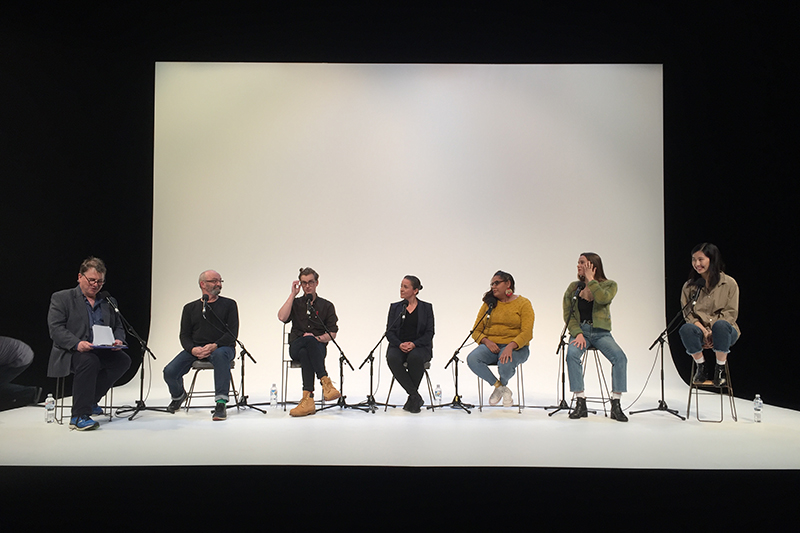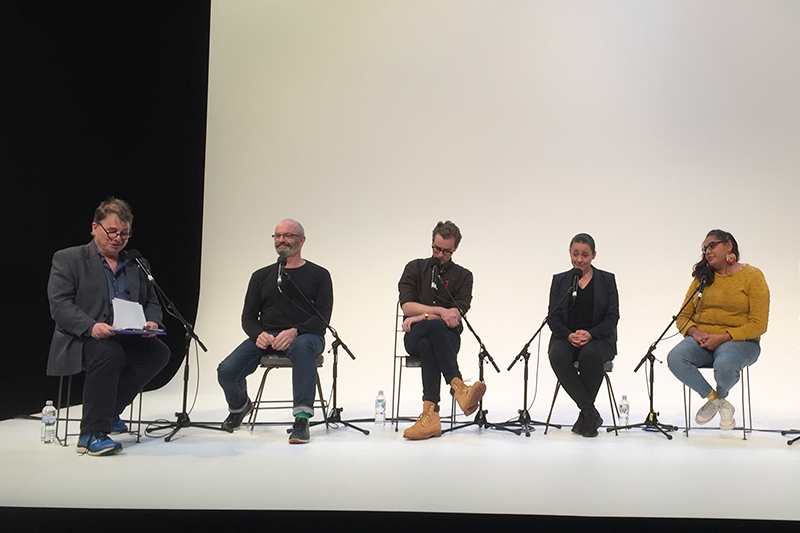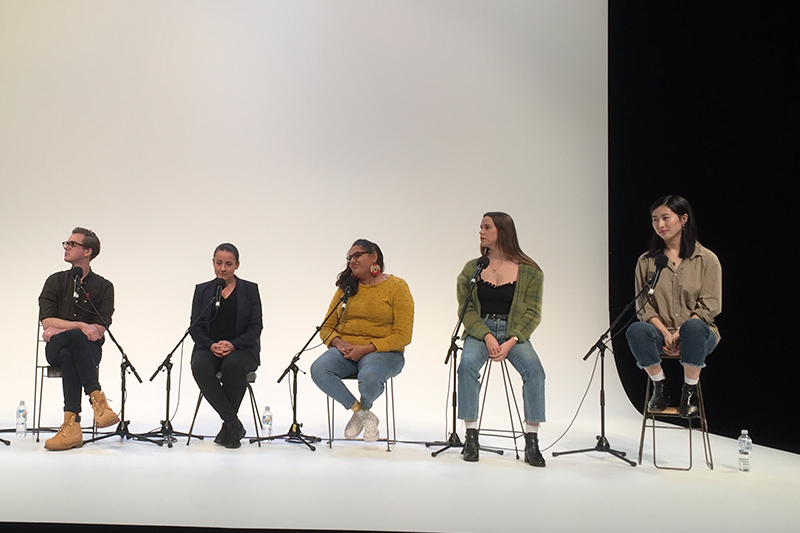Recently, NIDA was thrilled to have the team from ABC Radio National and ABC TV in the building recording a special 60th anniversary episode of The Stage Show.

(L-R)The Stage Show host Michael Cathcart; NIDA Director Centre for Acting John Bashford; NIDA Head of Directing, Course Leader Dr Benjamin Shostakowski; Artistic Director, Griffin Theatre Company and 2005 NIDA directing alumna Lee Lewis; 2017 acting alumna Dalara Williams (Blackie Blackie Brown, Top End Wedding, Black Comedy); third-year acting students Bronte Thomson-Sparrow and Mabel Li.
Recently, NIDA was thrilled to have the team from ABC Radio National and ABC TV in the building recording a special 60th anniversary episode of The Stage Show.
The Stage Show team, including long-time presenter Michael Cathcart, travelled from Melbourne for the occasion, to record the episode at one of NIDA’s theatres.
The conversation asked, ‘NIDA, the National Institute of Dramatic Art, turned 60 this year. So what’s it for, what’s life like at Australia’s most famous drama school, and what does it give to the rest of us?’
Staged as a panel interview with the focus on acting and directing, the show featured NIDA Director Centre for Acting John Bashford, NIDA Head of Directing, Course Leader Dr Ben Schostakowski, 2005 directing alumna Lee Lewis, who is Artistic Director of Griffin Theatre Company, 2017 acting alumna Dalara Williams (Blackie Blackie Brown, Top End Wedding, Black Comedy), recent directing graduate Tait de Lorenzo and final-year acting students Mabel Li and Bronte Thomson-Sparrow.
Recorded during the middle of NIDA’s June Student Production Season, the show took place on the set of pool (no water), designed by Master of Fine Arts (Design for Performance) student Aislinn King.
Listen to the episode here; view the segment on ABC Arts news program The Mix here (starts at timestamp 12:45) or read on for some highlights below.

(L-R) Michael Cathcart, John Bashford, Dr Benjamin Shostakowski, Lee Lewis, Dalara Williams
Highlights
Acting – NIDA’s beginning
Michael Cathcart, reading from an article published in The Sydney Morning Herald the day before NIDA opened: ‘”Students will study acting, speech, movement, dancing and fencing. They will study all the weapons used in stage duelling: rapier and dagger, cloak and dagger, quarterstaff, sword and shield.”
‘Is that an accurate representation of the sort of things that would have been studied back then, do you reckon?’
Director Centre for Acting, John Bashford: ‘I think so, because even though you might be using weapons like that, the study of the weapon is useful but it’s also preparing the mind. It’s dealing with repartee and the quickness of wit; the ability to come back at your scene partner with rapidity and clarity and focus.
‘You can be trained in the use of weapons for Game of Thrones, for instance, or The Hobbit, but there’s another use of weapons training which is much more to do with balance, poise, readiness, receiving, giving and those sort of things.’
Acting - NIDA alumna Dalara Williams
Michael Cathcart: ‘Are there aspects of your performing craft now that you recognise as dimensions that NIDA gave you?’
Dalara Williams: ‘A lot of technique and a lot of bravery in approaching a project. As you mentioned, I was part of Blackie Blackie Brown. I got brought in as understudy so I learnt that entire play in four days and I was on that stage without book to perform in front of an audience. Without the environment of NIDA, I don’t believe I would have been able to do that.
‘Understanding structure, understanding all the tools you need to get to that point without having the opportunity of a four-week rehearsal space- that’s what I took away from NIDA and have used in the world.
Michael Cathcart: ‘And that confidence to be in the moment, which is absolutely essential to that play, to just respond to whatever is happening to you right there and then.’
‘Yes. Owning your space and believing that you deserve to be there – with or without NIDA – but coming here did help me believe in myself, that I am able to stand and own my space out there in the industry.’
Directing – NIDA alumna Lee Lewis (Artistic Director, Griffin Theatre Company)
Lee Lewis: ‘[NIDA] gave me a great space to actually say out loud, “I’m a director.” It’s really quite hard to say that at the beginning.’
Michael Cathcart: ‘I’m imagining it’s terribly stimulating to come into this sort of environment every day and work with actors and people who are thinking about theatre – to put it at the centre of your universe rather than something you’re trying to do manage while you do some other job.’
Lee Lewis: ‘Yes, absolutely. The resources here are extraordinary, and the resources are really in the people here, the expertise in the building. If you’ve got a question there’s someone that can answer it – someone with a lot more experience than you, a lot more technical knowledge than you, and that’s exciting. To be able to have your questions answered straight away, on the day when you think of the question, is amazing because it means the next day you can move onto the next question. So it’s sort of an accelerating process.’

Directing – failure, success and the learning process
Michael Cathcart: ‘How are directing students assessed, Ben?’
Head of Directing, Course Leader, Dr Benjamin Shostakowski: ‘Our belief is that you need to learn by doing, and often that means failing at what you’re trying. The idea is that you’re actually trying something; you’re being ambitious with your ideas and seeing what works and what doesn’t work.
‘A project could, in an experience for an audience, not seem successful, but artistically they may have done something really exciting that’s developing their unique directorial voice, so we could say that’s actually a very successful assessment there, but you need to take that learning and put it into the next project.’
Michael Cathcart: ‘I think most theatre-goers would be familiar with the idea that some directors like to stay invisible. They really don’t want to be noticed, they want the text to speak for itself or they want to realise the author’s intention. That’s at one end of the spectrum. At the other is the director who puts him- or herself right in the foreground and sees the play as an opportunity to be really creative and mess things up. Does your own teaching practice fall somewhere along that spectrum or are you trying to embrace all ways in which theatre direction can be expressed?’
Dr Benjamin Shostakowski: ‘If we take six to eight directing students in per year, our job is really to figure out who each is as a person and who each is as an artist, and support them to develop their skills in that particular area.
‘We need to give them the opportunity to direct how they want to direct, and give them enough tools at the beginning of their process so that they can take those tools and apply them to whichever end of the spectrum they’re in, whether it’s auteur directing/director’s theatre, or whether it’s someone who’s more interested in well-executed classic text.’
Acting – what final-year acting students are looking forward to
Michael Cathcart: ‘It’s your final year. After Christmas you’re out there in the big wide world. What are you most excited about? Or, what are you most nervous about?
Mabel Li: ‘I’m really excited because I think the industry is at a changing-point where we’re becoming more aware of diversity and representation, which is something I’m really passionate about, being Chinese Australian. I think the industry is opening up for more opportunities for people from different diverse backgrounds. I’m really interested to join that and be a part of that.’
Michael Cathcart: ‘Bronte, what’s exciting for you?’
Bronte Thomson-Sparrow: ‘It’s so crazy, I should think about it more than I do – that I’m about to go out into the industry. I feel so in the moment at NIDA. I am excited. I’ve changed so much. The person who will walk out of NIDA is not the person who walked into NIDA.
Directing – the student journey
Michael Cathcart: ‘Tait, you’re a directing graduate. Have you been through the same kind of personal overhaul [as the acting students]?’
Tait de Lorenzo: ‘Yes, absolutely. When I think about the person that I was when I auditioned for this course, I feel like an entirely different person. Not only did the course give me the tools to be able to direct anything, it gave me the space to figure out the kind of work that I really wanted to direct and to be able to interrogate my own practice. Now, I’m a lot more sure of myself both as a human being and as a director.’
The future of live performance – final thoughts
Michael Cathcart: ‘Mabel said she was really optimistic about the future and where it’s headed. There are challenges, though. Theatre tickets are really expensive and the theatre industry has to compete with all sorts of other forms of entertainment, most of them much cheaper. You can actually have really marvellous entertainment in your home, especially now that people have got a room that’s called an ‘entertainment centre’ in their house. How do we train this current generation of theatre performers and theatre-makers to compete with that?’
Director Centre for Acting, John Bashford: ‘I think the principle difference is this: In the theatre you’ve got to work, as an audience. You have a responsibility, as does the actor, and there’s a two-way communication.
‘People will seek theatre out because of that engagement, because of the very fact that you are in a room at that particular moment in time with this collection of actors, can change you or the audience can change the performance as much as the performance can change the audience.
‘You cannot do that through 25 frames per second going through a projector screen, and the fact that you’re looking at it on an iPad or a big screen in your entertainment centre is distancing, so you don’t have to work. The work’s been done for you.
‘So there’s a different sort of engagement in theatre – that’s my view, it may not be everybody’s. I’m passionate about the fact that I go to the theatre and I’m working, because I’m interested in the conversation we’re having as a society, and I’m interested in the conversation we’re having as people about the way we live and how we live, and that in itself may be difficult and confronting but I’d rather do that than be anaesthetised in my awful Mac “home TV suite”.’
Michael Cathcart: ‘…Guess who’s not watching the telly tonight!’
Feeling inspired? Visit apply.nida.edu.au

